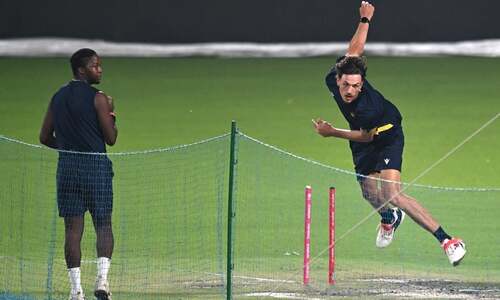Mustafa Zaidi, a well-known poet and a talented CSP officer, was found dead on Oct 12, 1970, in his hotel room in Karachi. He was 40. Found unconscious beside him was Shahnaz Gul, the subject of his several poems.
There are two views about Mustafa Zaidi's untimely death. The first alleges that he was poisoned by Shahnaz Gul. The other says he had committed suicide. The mystery has not been resolved. No one knows for sure what actually happened on that fateful night and in the absence of convincing evidence no one could be indicted by court, as in a tragically prophetic couplet of his, Mustafa Zaidi had said
Main kis ke haath pe apna luhoo talash karoon
Tamaam shehr ne pehne huay hain dastaane
In either case, it was a tragic incident that deprived Urdu of a poet whose potential promised a lot and whose creative genius had been appreciated by such literary stalwarts as Josh Maleehabadi and Firaq Gorakhpuri.
Since the case was a high-profile one, it created bold headlines in the newspapers and had been discussed for long. Even today, it draws attention of the readers and critics alike when Mustafa Zaidi's poetry is discussed. The discussion somehow turns to his death, the circumstances and the reasons for his committing suicide and/or the motives behind the murder. This, in turn, has caused critics to preconceive certain ideas about Mustafa Zaidi and his poetry. Some critics, for instance, look for the psychosomatic aspects of his personality.
These critics feel that despite swinging in the lap of luxury and having drowned himself in the “sea of sensuousness”, Mustafa Zaidi always bemoaned his own 'plight', looking for recognition as a poet and more and more sexual gratification. His discontent, they believe, is a direct outcome of his perversion and hedonistic approach towards love and life itself that left a spiritual hollow in his inner self and, so goes the argument, this 'black hole' of spiritual void eventually swallowed him. Zafarullah Khan, in his book 'Mustafa Zaidi shakhsiyyet aur shaeri', has blamed Zaidi's Marxist and modernistic approach for creating a materialistic craving and dissatisfaction with whatever he had. A too simplistic explanation, perhaps.
In his book, Khan cited Mustafa Zaidi's own words in which he had admitted that, at the age of 26, by temperament he was a lovebird and during the previous five-year period he had fallen in love with seven girls; of whom, for three he had tried to commit suicide (page 136). Khan has also quoted the October 15, 1970 issue of Karachi's daily Jang that says “according to the circles close to the late Mustafa Zaidi, it was his fifth attempt to commit suicide. First he had tried to take his life at Keamari [Karachi port]. Then he tried to commit suicide when he was a lecturer at Peshawar University [we later learn in the book that he had fallen in love with an American teacher, and a cold shoulder from her had prompted that attempt]. Later, when he came to Karachi, he tried for a third time to kill himself. When he was sacked by the government with 303 other officials, he again tried to commit suicide. And now in Karachi, for the fifth time he attempted and did commit suicide.” (page 18).
Then on the very next page we find in Khan's book Shahnaz Gul's statement given to the police, published in the October 16, 1970 issue of Jang, Karachi, that says “Zaidi had been forcing me for marriage. I reminded him that he was already married, with two children, and so was I. Though I liked him, I could not marry him ... It created bad blood between us and soon we resolved our differences. He had said many times that if I didn't marry him, I would be responsible for his death”.
This was the viewpoint of those who blame Zaidi for all his troubles and the tragic end to a life that was the envy of many. Then there is the other point of view, blaming society for not being tolerant enough of his views and the government for 'mentally torturing' and dismissing him from service. It all culminated, they believe, in his being compelled by the circumstances and taking his own life.
Zaidi himself had blamed everyone, including himself, though somewhat sarcastically, for not getting whatever he desired and deserved. Zaidi complained in the preface to 'Koh-i-Nida', his last collection of poetry, that Wazeer Agha referred to many minor poets in the thick volume he had written on Urdu poetry, but ignored him. He was wary of society that, in his words, “did not tolerate different ideologies”.
He lamented that he could not pursue his hobby of photography because a stable-like house was allotted to him and he could not continue flying because of a forced landing and subsequent destruction of the aircraft. His other lament was that he had been a misfit in the civil service of Pakistan and was sacked just because he had refused to accept bribes from one of his subordinates. (Although Zaidi was sacked on charges of corruption, his relationship with Shahnaz was also blamed by many for it, as she was the wife of a contractor and Zaidi was an important official).
Born Syed Mustafa Hasnain Zaidi on Oct 10, 1930 in Allahabad, Mustafa Zaidi was known as Tegh Allahabadi before changing his penname. He published his first collection of poetry when he was barely 17. Having obtained his Master's in English literature in 1952 from the Government College, Lahore, Zaidi initially taught at Karachi's Islamia College and then at Peshawar University. In 1954, he passed the competitive examination and was sent to England for training before being given the posts of deputy commissioner and deputy secretary.
The initial phase of Zaidi's poetry was a romantic one, in every sense of the word. Publishing his first collection 'Zanjeeren' at the age of 17, he showed a remarkably matured style and mental level rarely achieved by a teenager. His fascination with Firaq's poetry waned later on but the imprints of Josh Maleehabadi's high-sounding, oratorical and rebellious style remained with him forever, lending a tint to his poetry. Josh's fondness for verbal grandeur and his somewhat romantic image of the revolution always haunted Zaidi. Soon he found his own voice and forsaking the old-sounding penname and old-fashioned romanticism, Zaidi began to bemoan the ruthless realities of a more mundane nature and turned sour.
His couplet that has become his trademark is
Inhi patharon pe chal kar agar aa sako to aao
Mere ghar ke raaste mein koi kehkashan nahin hai
Though some of his ghazals are oft-quoted, poem was his forte and poems such as 'Aqwam-i-Muttahida', or the United Nations, provided him with a chance to voice his dissatisfaction with the institution.
The last phase of his poetry saw an imagist getting his true colours and striving for the perfection that eludes most writers till the very end. But at just about the same time, a deep discontent and an acrimonious tone starts developing. In December 1969, he was suspended from service and the last one year or so of his life was, probably, the most tortuous one. His affair with Shahnaz soured his relation with his German wife, who flew to Germany with their two children. Later he was sacked and Shahnaz was the only support he could lean against. The last five poems of his life are titled 'Shahnaz', and what passionate and emotional poetry it is!
His collected works, 'Kulliyaat-i-Mustafa Zaidi', were published posthumously and include his collections 'Roshni', 'Shehr-i-Aazar', 'Mauj meri sadaf sadaf', 'Gireban', 'Qaba-i-saaz' and 'Koh-i-Nida'.



























